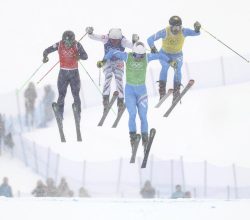13:30 JST, January 24, 2022
Staying in power forever is difficult for any authoritarian ruler. The downfall of a leader who was viewed as a model for tyranny may have served as a warning to heads of state plotting long-term dictatorships.
Former Kazakh President Nursultan Nazarbayev announced he has retired completely from politics in the Central Asian country where he reigned for more than 30 years since the last days of the Soviet Union.
Anti-government protests that broke out earlier this month prefaced his move. Nazarbayev became the target of people protesting soaring fuel prices.
Nazarbayev led Kazakhstan’s development by attracting investment in the country’s abundant resources such as oil, natural gas and uranium. He built good relations with Russia, China, the United States and Europe.
Even after resigning as president in 2019 and installing close aide Kassym-Jomart Tokayev as his successor, Nazarbayev has remained in key positions such as chairman of the Security Council, monopolizing power and wealth as the de facto supreme leader. His family reportedly owns real estate worth more than ¥50 billion in Britain.
Protesters tore down a statue of Nazarbayev, raising their voices against disparities between the rich and poor and corruption. It could be said that anger over the distortions and injustices created by long-term rule has erupted.
Tokayev probably saw the unrest as an opportunity to seize power. He removed Nazarbayev from office and detained a close aide who headed the security sector. Nazarbayev had no choice but to leave center stage.
The seemingly rock-solid authoritarian regime collapsed all too easily. For Russian President Vladimir Putin and Chinese President Xi Jinping, who are both conspiring to establish long-term rule, it is not someone else’s problem.
The unrest appears to have subsided for now, but the people and the nation have lost a lot.
Clashes between protesters and security forces have resulted in more than 4,500 casualties. This was because Tokayev branded the protesters as terrorists attempting subversion and allowed the security forces to fire at them. Atrocities committed against peaceful protests should never be tolerated.
Tokayev has asked the Russian-led military alliance of states in the former Soviet bloc to send troops to quell the situation. Russia deployed troops under the pretext of the involvement of foreign-backed forces in the protests.
The unrest in Kazakhstan is a problem that stemmed from domestic economic policies and should not be treated as a matter requiring the dispatch of international troops. The reality is that Tokayev sought Putin’s support to reinforce his power base and as a result allowed Russia to expand its influence.
Tokayev succeeded in consolidating power, but will he follow in Nazarbayev’s footsteps?
The original Japanese article appeared in The Yomiuri Shimbun on Jan. 24, 2022.
Top Articles in Editorial & Columns
-

Riku-Ryu Pair Wins Gold Medal: Their Strong Bond Leads to Major Comeback Victory
-

China Provoked Takaichi into Risky Move of Dissolving House of Representatives, But It’s a Gamble She Just Might Win
-

University of Tokyo Professor Arrested: Serious Lack of Ethical Sense, Failure of Institutional Governance
-

Japan’s Plan for Investment in U.S.: Aim for Mutual Development by Ensuring Profitability
-

Policy Measures on Foreign Nationals: How Should Stricter Regulations and Coexistence Be Balanced?
JN ACCESS RANKING
-

Japan PM Takaichi’s Cabinet Resigns en Masse
-

Japan Institute to Use Domestic Commercial Optical Lattice Clock to Set Japan Standard Time
-

Israeli Ambassador to Japan Speaks about Japan’s Role in the Reconstruction of Gaza
-

Man Infected with Measles Reportedly Dined at Restaurant in Tokyo Station
-

Videos Plagiarized, Reposted with False Subtitles Claiming ‘Ryukyu Belongs to China’; Anti-China False Information Also Posted in Japan



















